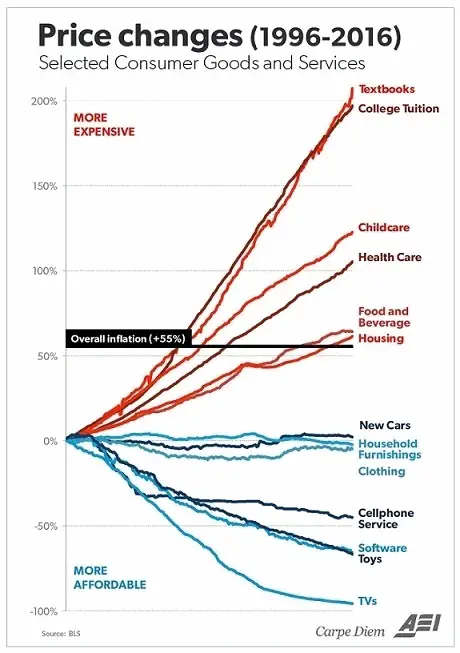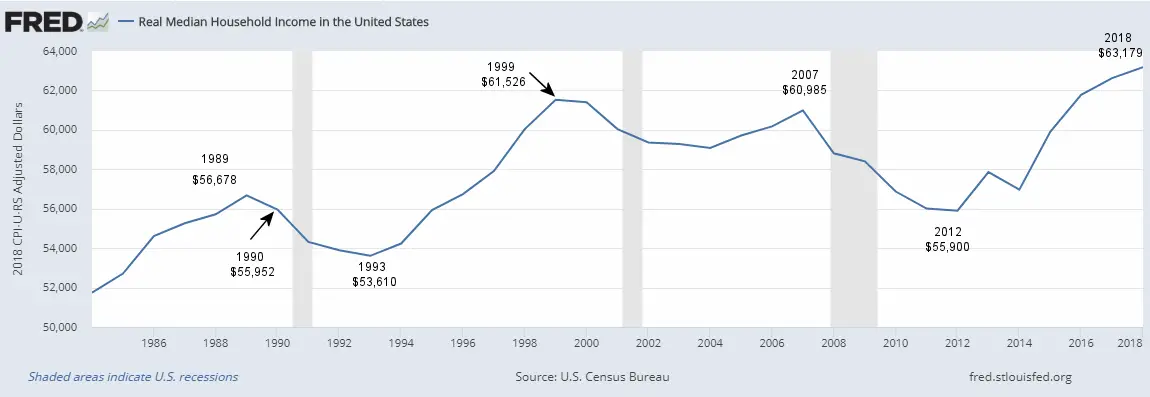I recently came across an interesting article by Paul O’Brien on Quora. For those who may not know, Quora is a site where individuals can ask questions and get a variety of different answers from people in the community (hopefully subject matter experts). I have been participating in answering questions on Quora for a few years now. But I particularly liked this answer and thought I would share it with you. Although the original question was “Is capitalism failing? Why or why not?” Paul chose to answer based on the inflation rate of various categories of consumer goods. ~Tim McMahon, editor
Is Capitalism Failing? Why or Why Not?
By Paul O’Brien
Let’s run down the list from the lens of the U.S. (as circumstances will vary depending on where you live), top to bottom:
Textbooks – Highly regulated by the government where States and the Fed + Dept. of Education, heavily influence what can be taught and how. Book publishers run lobbies that establish government-supported use of the Text Books themselves, or at least, the “proprietary” knowledge contained within. All this, when all the same information is freely available online (thanks to Capitalism).
College Tuition – Universities are controlled by Federal and/or State policies regarding Non-Profit/Profit status, employment tenure, and acceptance.
Childcare – Not as government-run as Education but certainly very regulated by Local, State, and Federal government.
Health Care – Really, do we even need to go here? Government enabled Insurance monopolies and State enabled provider monopolies, as well as very strict FDA pharma policies, and onerous education requirements in nursing put us in the mess that led to ACA (government-mandated), which made things worse.
Food and Beverage – Farm subsidies, FDA approvals, FDA disregard of the health impact of things like Insecticides, processing wheat, and corn syrup. Woohoo, government!
Housing – What caused the housing bubble and burst? The government policy of bank’s mortgages and then government bailout of those same banks who really just did what government enabled them to do. Yay government.
New Cars – Understandably a TON of safety regulation but did you know? Capitalist Volvo invented the seat belt and gave away the technology? Tesla is doing the same with many of their patents. Capitalist driven robotics is making cars now, insanely affordable; relatively speaking.
Household Furnishings – Electronics and appliances are regulated but furniture really isn’t, to speak of. I just bought an outdoor table and chairs for $150 from Home Depot…
Clothing – Aside from government subsidies in farming (supporting cotton), and safety oversight because yes, clothing can be harmful, we can buy clothes for mere single digit dollars today, thanks to capitalism.
Cellphone Service – fairly regulated by the FCC but the underlying technology is highly free-market capitalism and we’re seeing the impact of that in the pace of innovation of Wireless Service and Smart Phone capabilities. Without Capitalism, we’d still be using the telephone.
Software – extremely free-market capitalism. Create a program, app, or website right now, you don’t need any approval or oversight.
Toys – extremely free market capitalism… you could make and sell Toys right now. If you do it through retail or with things like plastics or other in consideration of young children, you’ll have some health and safety considerations.
TVs – extremely free market capitalism.. you could make and sell a TV right now with only health and safety considerations of components.
So I might offer as an answer that Capitalism is failing to keep government out of the way so that it might make education, healthcare, and more, just as affordable and accessible as everything else.
Clearly, capitalism is enabling the world to improve the standard of living of everyone, everywhere.
Some comments were made on the original post indicating that another reason for the massive increase in the cost of education is government subsidies to tuition in the form of grants and reduced interest rates for student loans, which increases demand and prices. See our article on Education Inflation for more info.
Other Comments:
– Zachary Gemmill -“Food in service establishments has gone up noticeably in California due to government mandating higher minimum wage.”
Tyler Yates -“It blows my mind how politicians can see the benefits of “free trade” between nations, but not between companies and industries. Almost like they think the free market doesn’t exist unless dealing with their own international trade, tariffs and taxes…”
Jack Raymond Borden, B.S. Finance & Economics, University of Nebraska-Lincoln – To answer this question I think we first have to define capitalism… it is an economic system where economic activity is predominately controlled by people rather than the government. No society is 100% laissez-faire capitalistic but every country (with the exception of Cuba and North Korea) live in societies where a majority of people have jobs which aren’t associated with the government… Given the global dominance of capitalism, I would say Capitalism isn’t dying. Capitalism on a global scale is going through a renaissance. This is mostly because of China and India which have economically liberalized their nations, and because of the pro-free trade rhetoric which has been pushed by the Western World. A combination of these two factors have pushed global economic growth rates to historically high levels and have led to a corresponding drop in global poverty rates.
According to the World Bank extreme poverty has been plummeting dramatically thanks to the spread of global capitalism. Extreme poverty in just 23 years has fallen by more than 2/3rds from 35% in 1990 to 10.7% in 2013…
Another factor that is depressing capitalistic growth in the West is because of technological deflation. Technological deflation is a trend where computers and software are making the cost of living cheaper than it used to be which lowers inflation levels. Examples of this include the internet which plummeted the cost of information to (almost) zero or the rise of a booming smart-phone application [app] market which has demonetized millions of dollars worth of goods.
To give you an idea of how powerful this demonetization is, I would encourage you to read this article Why the Cost of Living Is Poised to Plummet in the Next 20 Years. According to this article, a modern smart-phone has demonetized 900,000 dollars worth of goods that a consumer would’ve bought in the 1970s and 1980s… living standards (the amount of money that each person earns) is still rising in the west… To back this statement up, I have provided data from the Federal Reserve Bank of St. Louis which shows Real Median Household Income by year adjusted for inflation. Real Median Household Income in the United States
If you look at the inflation-adjusted data (in 2018 dollars), it shows that in 1990 (just before technological deflation started to take off thanks to the internet) was at $55,952. If you flash forward to 2018 this number has risen to $63,179 which is 12.9% higher. Remember, this is in REAL (i.e. inflation-adjusted terms). So households are about 13% better off than they were in 1990. Even if we look at the absolute peak in 1989 it was only $56,678. i.e. we have an 11.4% increase in REAL inflation-adjusted household income over the peak of the 1980s. And at the peak in 1999 it was $61,526, so even with the “Great Recession” household income is currently 2.7% higher than at the peak of the 1990s. This does NOT indicate a declining trend! Higher peaks is the key indicator of a rising trend. We also have higher lows, with the trough in 1993 at $53,610 and the low at the bottom of the Great Recession at $55,900.
[Editor’s Note: Dips were caused by external forces unrelated to Capitalism i.e. massive rise in oil prices that happened thanks to the industrializing of China and India, and the political instability in Iraq from the Iraq War and the 2008 Financial Crisis which resulted from Government stimulation of the housing market and the creation of “risk free” investments that actually shifted risk from the individual (or company) to the society as a whole. Remember the definition of Capitalism is an economy free from government intervention, so you can’t attribute a failure of Capitalism to a situation that is caused by Government intervention.]
Resources:
- Quora.
- Education Inflation
- World Bank (PovertyStatistics)
- Why the Cost of Living Is Poised to Plummet in the Next 20 Years.
- Real Median Household Income in the United States
See Also:




Leave a Reply